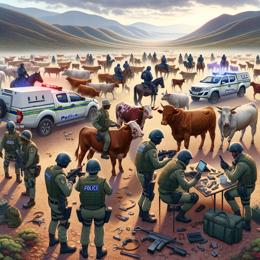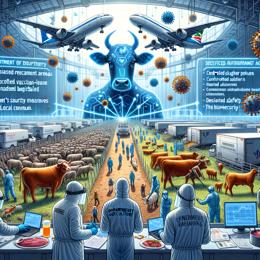Image created by AI
South African Farming Threatened by High Court Ruling on Mining Without Compensation
The future of farming in South Africa's lush landscapes hangs in the balance following a groundbreaking decision by the Mpumalanga High Court. In a case that has pitted agricultural interests against the might of the mining industry, the court has ruled that mining operations can proceed on a farmer's land in Delmas without finalized compensation arrangements. The ruling has raised alarm bells for AfriForum and Saai (the network for family farmers), who are aggressively voicing their concerns and planning their legal riposte.
Experts warn that this case could set a dangerous precedent, undermining the already precarious position of agriculture in South Africa — a nation where a mere 1.5% of the land is suitable for farming. With nearly half of this arable land located in Mpumalanga, and over 60% of the province's land surface already overshadowed by mining operations, the tension between sustaining crop production and exploiting mineral resources has never been more acute.
The genesis of this controversy is rooted in the negotiations between CJ Williams en Seuns Boerdery (Pty) Ltd and Stuart Coal (Pty) Ltd which have hit an impasse since 2019. Following their inability to agree on a compensation figure, the dispute catapulted to the Department of Minerals and Petroleum Resources. With no resolution in sight, the matter was escalated to the courts, culminating in the recent ruling that enables Stuart Coal to begin their extraction on agricultural land without an agreement in place, threatening the viability and heritage of the CJ Williams en Seuns Boerdery family farm.
Environment advisor at AfriForum, Marais de Vaal, called upon the Department of Mineral and Petroleum Resources to step up and protect the interests of the agricultural sector. However, given the ruling and the department’s actions, concerns remain that the department is not maintaining an impartial stance, skewing towards the mining industry instead.
Compensation is intended to be determined pending valuations; yet, as the mining operations take root, the potential to lower land values looms large. With no clear assurances on fair compensation, the fabric of property rights and fair treatment is put to the test.
On a broader scale, the standoff between agriculture and mining interests raises critical questions about ecological sustainability and food security in the region. The throw-down strikes at the core of property rights, with implications that reach every landowner in the country.
AfriForum and Saai both contend that such rulings practically sterilize fertile land and dismantle the bargaining power of landowners, jeopardizing their livelihoods. Further, they express the harsh reality that a farmer cannot simply relocate their farm, forewarning the potential demise of multi-generational farming families like that of CJ Williams en Seuns Boerdery.
Saai, under the leadership of CEO Francois Rossouw, vehemently opposes the ruling and advocates for legislative amendments to shield property rights from such unjust practices.
The two organizations now resolve to fight this legal battle up to the highest levels, seeking an urgent remedy to the legislation to forestall further harmful consequences and ensure the prominence of fair compensation.










